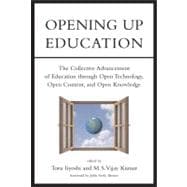
Note: Supplemental materials are not guaranteed with Rental or Used book purchases.
Purchase Benefits
What is included with this book?
| Foreword: Creating a Culture of Learning | p. xi |
| Acknowledgments | p. xix |
| Introduction: An Invitation to Open Up the Future of Education | p. 1 |
| Open Educational Technology | p. 11 |
| Section Introduction | p. 13 |
| öOpen Educational Technology: Tempered Aspirationsö | |
| öDesigning Open Educational Technologyö | p. 27 |
| öThe Gates Are Shut: Technical and Cultural Barriers to Open Educationö | p. 47 |
| öDoes an Open Source Strategy Matter? Lessons Learned from the iLabs Projectö | p. 61 |
| öEvaluating the Results of Open Educationö | p. 77 |
| öA Harvest Too Large? A Framework for Educational Abundanceö | p. 89 |
| öDigital Libraries, Learning Communities, and Open Educationö | p. 105 |
| öOpen Source in Open Education: Promises and Challengesö | p. 119 |
| Open Educational Content | p. 133 |
| Section Introduction: ôOpen Educational Content: Transforming Access to Educationö | p. 135 |
| öWidening Participation in Education through Open Educational Resourcesö | p. 149 |
| öBuilding Open Learning as a Community-based Research Activityö | p. 165 |
| öExtending the Impact of Open Educational Resources through Alignment with Pedagogical Content Knowledge and Institutional Strategy: Lessons Learned from the MERLOT Community Experienceö | p. 181 |
| öWhy Understanding the Use | p. 197 |
| öOpenCourseWare: Building a Culture of Sharingö | p. 213 |
| öChallenges and Opportunities for the Open Education Movement: A Connexions Case Studyö | p. 229 |
| ö2005-2012: The OpenCourseWarsö | p. 247 |
| öRevolutionizing Education through Innovation: Can Openness Transform Teaching and Learning?ö | p. 261 |
| Open Educational Knowledge | p. 277 |
| Section Introduction: ôOpen Educational Knowledge: More than Opening the Classroom Doorö | p. 279 |
| öInquiry Unplugged: A Scholarship of Teaching | p. 289 |
| öThe Middle of Open Spaces: Generating Knowledge about Learning through Multiple Layers of Open Teaching Communitiesö | p. 303 |
| öOpen Teaching: The Key to Sustainable | p. 319 |
| öPromoting Technology-enabled Knowledge Building and Sharing for Sustainable Open Educational Innovationsö | p. 337 |
| öScaffolding for Systemic Changeö | p. 357 |
| öLearning Design: Sharing Pedagogical Know-Howö | p. 375 |
| öCommon Knowledge: Openness in Higher Educationö | p. 389 |
| öOpen for What? A Case Study of Institutional Leadership and Transformationö | p. 401 |
| öWhat's Next for Open Knowledge?ö | p. 417 |
| Conclusion: New Pathways for Shaping the Collective Agenda to Open Up Education | p. 429 |
| About the Authors | p. 441 |
| Index | p. 451 |
| Table of Contents provided by Publisher. All Rights Reserved. |
The New copy of this book will include any supplemental materials advertised. Please check the title of the book to determine if it should include any access cards, study guides, lab manuals, CDs, etc.
The Used, Rental and eBook copies of this book are not guaranteed to include any supplemental materials. Typically, only the book itself is included. This is true even if the title states it includes any access cards, study guides, lab manuals, CDs, etc.